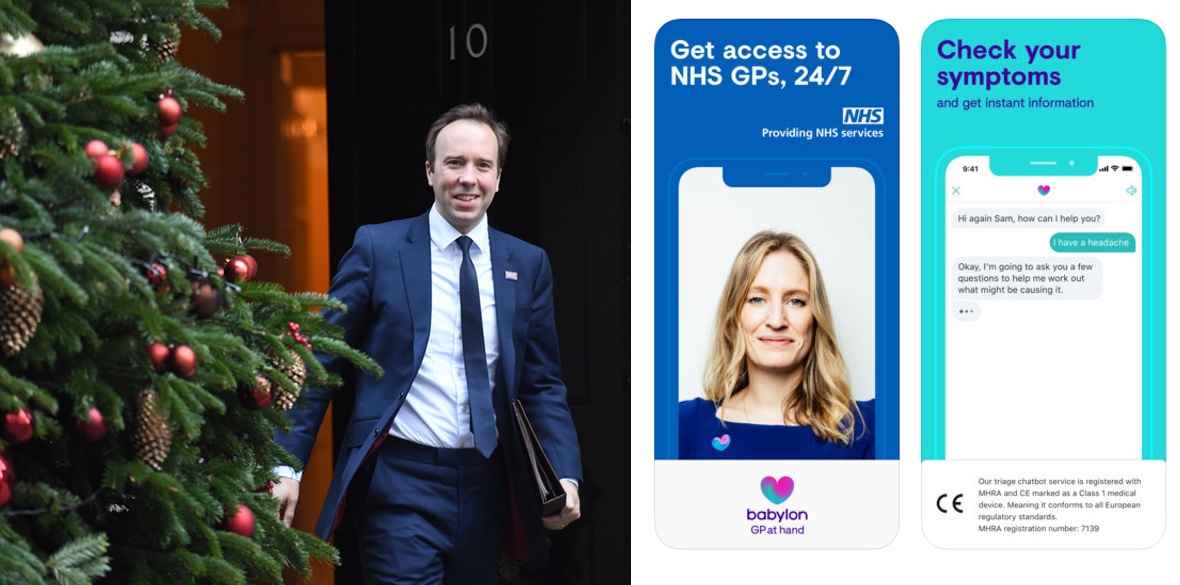This is the last article you can read this month
You can read more article this month
You can read more articles this month
Sorry your limit is up for this month
Reset on:
Please help support the Morning Star by subscribing here
IN NOVEMBER an interview with Health Secretary Matt Hancock appeared in an Evening Standard article “sponsored” by NHS privatiser Babylon Health.
In the interview, which was paid for by Babylon Health, Hancock specifically praised the company’s app: Babylon run a system called “GP at Hand” which lets users consult a doctor by video on a smartphone or laptop. Hancock said he personally uses Babylon’s GP at Hand — the Evening Standard say he “chuckled” about it — and said the NHS should “embrace the technology” they offer.
After the BuzzFeed news website highlighted the interview, the Labour Party complained that Hancock seems to be breaking the Ministerial Code. Specifically the part that says ministers
“should not… normally accept invitations to act as patrons of, or otherwise offer support to… organisations dependent in whole or in part on government funding.”
With the Health Secretary promoting health privatiser Babylon in a Babylon-funded newspaper supplement, with his interview actually appearing under a “Babylon Health” logo, you can see why Labour is complaining. Look a bit closer and we can see two essential facts. Firstly, Babylon has a series of personal connections to the government — it looks like cronyism, not competition. Secondly, Babylon and its founder have been involved in serious failures in their NHS business.
The first, most obvious connection is the Evening Standard itself. The Standard is edited by former Tory chancellor George Osborne. Osborne agreed a controversial corporate sponsorship scheme called “Future London,” in which businesses pay the Evening Standard an estimated £500,000 in a “partnering” arrangement. Babylon Health are one of the six corporations paying the Standard. In return they get pages of coverage in the paper promoting the company with promo-style articles on their “apps.” In turn Hancock is close to Osborne. Hancock started in politics as one of Osborne’s special advisers. A profile on Tory website “ConservativeHome” described Hancock as a founder member of the “small, merry band” round Osborne.
Babylon has a history of hiring Tory or government-connected folk. When Babylon launched its NHS app in 2017, it hired Trafalgar Strategy to run the PR, a firm founded by former Cameron head of press Giles Kenningham.
Babylon’s “director of NHS services” is Paul Bate. He was David Cameron and Nick Clegg’s “health policy” adviser during the coalition.
Cameron hired Bate because he wanted to bring in former Blair advisers: Bate is not a Tory Party apparatchik. He was a “modernising” civil servant committed to privatisation by both parties. He was previously in Tony Blair’s “prime minister’s delivery unit” on Health Targets from 2003-6 — when the New Labour government met health targets by outsourcing NHS operations to private providers.
Babylon is run by health investor Ali Parsa. He and his firms have a history both of hiring political “insiders” and of poor performance. In 2017 the Care Quality Commission (CQC) examined Babylon’s online GP-by-video service and found it was “not providing safe care”. The CQC highlighted dangers that prescriptions could be misused and problems about what information was shared with GPs.
So Babylon went to court to stop the CQC publishing the report. The injunction failed and Babylon had to pay the CQC’s costs. You’d think Babylon trying to sue the main NHS regulator into silence would make the government give it a wide berth. Instead, Matt Hancock has repeatedly boosted the firm in his speeches, visited its HQ and seen the firm take up more NHS contracts.
Critics say Babylon’s online GP service will take NHS money, trick NHS patients away from their regular GPs and provide a potentially unsafe service. But it still gets government support.
Babylon is Ali Parsa’s second attempt to get NHS work. Parsa previously ran Circle Health, a private hospital firm he founded in 2004. Circle won a controversial 10-year contract to run an NHS hospital, Hinchingbrooke, in 2011. This ground-breaking privatisation project became a broken project: in 2015 inspectors from the CQC judged the hospital “inadequate” for patient safety. Circle gave up running the hospital, six years before the contract was supposed to end.
This doesn’t give confidence in Ali Parsa’s new business. But Circle also had Tory help. Mark Simmonds, a Tory MP who went on to be a minister, was paid £50,000 a year to be a “strategic adviser” to Circle.
Another of Cameron’s former health advisers, Nick Simmonds, worked as Circle’s top spin doctor. So Parsa’s previous health firm worked on a formula of cronyism, hiring “insiders,” winning NHS privatisation contracts, then taking cash for bad NHS services before crashing out.It’s a record that under any reasonable system should block him from future NHS work. The government backing for Babylon Health shows we do not live in a reasonable system.
Follow Solomon Hughes on Twitter @SolHughesWriter.










